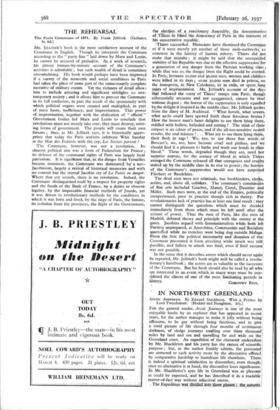THE REHEARSAL
The Paris Commune of 1871. By Frank jellinek. (Gaga= 8s. 6d.) MR. jELLINEK'S book is the most satisfactory account of the Commune in English. Though he interprets the Commune according to the " party line " laid down by Marx and Lenin, he cannot be accused of prejudice. As _a work of research, his almost minute-by-minute account of the Commune's activities is admirable ; but such wealth of detail is sometimes overwhelming. His book would perhaps have been improved if a survey of the economic and social conditions in Paris had taken the place of some part of the unnecessarily complete narrative of military events. Yet the richness of detail allows him to include amusing and significant sidelights on con- temporary society ; and it allows him to present the Commune in its full confusion, in part the result of the _spontaneity with which political organs were created and multiplied, in part of mere haste, inefficiency, and improvisation. This power of improvisation, together with the abdication of " Official." Government bodies led Marx and Lenin to conclude that revolutions must not merely take over, they must destroy, exist- ing forms of government. The people will- create their owri forums ; thus, as Mr. Jellinek says, it is historically appro- priate that today the Paris workers celebrate Whit Sunday at* the Mur des Federes with the cry, Les Soviets partout !
The Commune, however, was not a revolution. Its dearest political aim was a form of Federalism for France ; its defence of the communal rights of Paris was largely local patriotism. It is significant that,liti the danger from Versailles beCame imminent, the Commune was dominated 'by' a nec- Jacobinism, largely a revival of historical memories and with no content but the eternal' Jacobin cry. of La Patric en danger. Where that cry sounds, there is no revolution. Indeed, the Commune distinguished itself by a respect for property rights and the funds of the Bank of France, by a desire to observe legality, by the impeccable financial methods of Jourde, yet it was driven to revolutionary methods by the conditions in which it was born and lived, by the siege of Paris, the famine, its isolation from the provinces, the flight of the Government,
the elect:Son, of reactionary Assembly, the determination of Truer,to bked. the democracy Of Paris. in the interests of his conservative republic.
-Thiers succeeded. Historians have dismissed the Comm-une if it were merely yet- another of :those mob-outbreaks.: S3 common in the history. of. human misery. Thiers did -not make that mistake ; it_ might be said that the unexpectted stability of his Republic-was due to the effective suppression for a -generation of any danger from the Parisian working class ; While that was so, the danger from the Right could be averted. In Paris, between 20,000 and 3o,000 men, women and children were killed in to days ; some 30,006 men died in prison; on the transports, in New Caledonia, Or in exile, or spent, king
. . •
rtars of imprisonment. Mr. jellinek's account of the diiys *it followed the entry of Thiers' troops into Paris, though
.
stbstantially accurate and not exaggerated, cannot be 'read without disgust ; the horror of the suppresaion is only equalled bLthe delight it inspired in the middle class: Mr. Jellinek quotes from the diary of M. Audeoud. " What hovels, what sewers, What- gaols could have spewed forth these ferocious brutes ? How. the honest man's heart delights to see them lying there, riddled with bullets, befouled and rotting l The stink of their corpses is an odour of peace, and if the all-too-sensitive nostril revolts, the soul rejoices ! . . . What joy to see them lying ththe, their flesh in rags ! We, too, to use those fine words. of Bossuet's, we, too, have become cruel and pitiless, and we should find it a pleasure t ) bathe and wash our hands in ffieir blOod." These words, degraded though they are, need itot surprise anyone, for the ecstasy of blood in which Thiers avenged the Commune released all that corruption and cruelty stored up by the middle class in its rise to power; the horrors of the Commune's suppression would not have surpriied Flaubert or Baudelaire.
The dead men were not criminals, but bookbinders, cleAcs, artilts, and, abOve all, cobblers. The commune's cozrunissrOn of fine arts included COurbet; Manet, tarot,.,Paiiinier and Millet. Such men were, at the end of the Empire, politically inexperienced, poor in practice though rich in theory. For revolutionaries lack of practice has at least one fatal result : they cannot distinguiSh the questions which must be decided immediately from those which -must be left-until -after the seizure of power. Thus the men of Paris, like the men of, Madrid, debated theory and principle with the enemy at the gates. Jacobins argued with-Internationalists while both left Fortissy unprepared, as Anarchists, Communists and Socialism; quarrelled while no trenches were being dug outside Malaga.: Prom the first the political immaturity and disunion- of the: Commune prevented- it -from attacking while attack was still: riossible, and failure to attack was fatal; even if final success'; Was not possible.
In the sense that it describes errors which should never again be repeated, Mr. Jellinek's book might well be called a revolu-• tionary's handbook; the errors are as valuable as the successes! of the Commune. But his book should also be read by all who are interested in an event, which in many ways must be conLf! sidered the climax of one of the most fasdnating periods in


















































 Previous page
Previous page